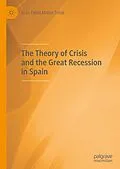This book has a dual purpose. Firstly, it analyses the concept of economic crises within economic theory, showing the various theoretical foundations and controversies amongst different schools of economic thought. Secondly, it presents an empirical analysis of the Great Recession in Spain, addressing both the growth period from 1995 to 2007-08 and the subsequent depression until 2013-14.
Using a political economy approach, the aim of this book is not to explain the root causes of the 2007-08 crisis but to demonstrate the way in which the tendency towards a crisis manifests itself in a given economy in a historical context. In other words, this book focuses upon the reasons why an issue (such as the crisis of profitability) adopts a certain form, or how it is shaped - for example, the process of capital accumulation being led by a real estate bubble. Consequently, the two divisions in this book are linked by the role of the Spanish economy in European capitalism.
This theoretical and empirical heterodox approach will be of interest to students and scholars in political economy, and those with an interest in the Eurozone.
Autorentext
Zusammenfassung
This book has a dual purpose. First, it analyses the concept of economic crises within economic theory, showing the various theoretical foundations and controversies amongst different schools of economic thought. Second, it presents an empirical analysis of the Great Recession in Spain, addressing the growth period of 1995 to 2007-08, the subsequent depression until 2013-14 and the recovery that followed. It also shows the way in which the inner contradictions of capital manifests itself in an European peripheral economy under a real estate bubble, emphasizing the role of the Spanish economy in European capitalism.
This theoretical and empirical heterodox approach will be of interest to students and scholars in political economy, and those with an interest in the Eurozone.
Inhalt
